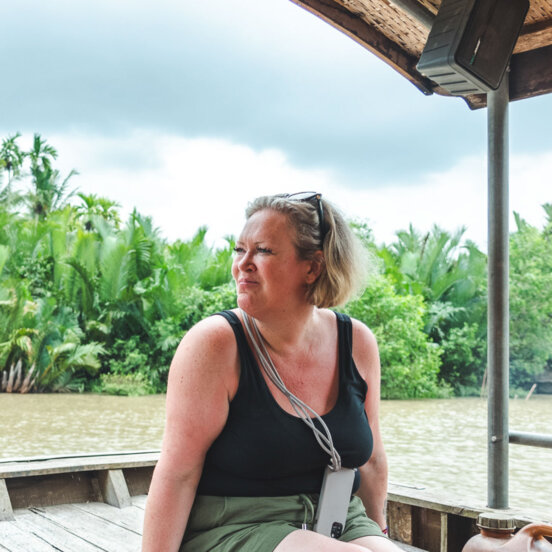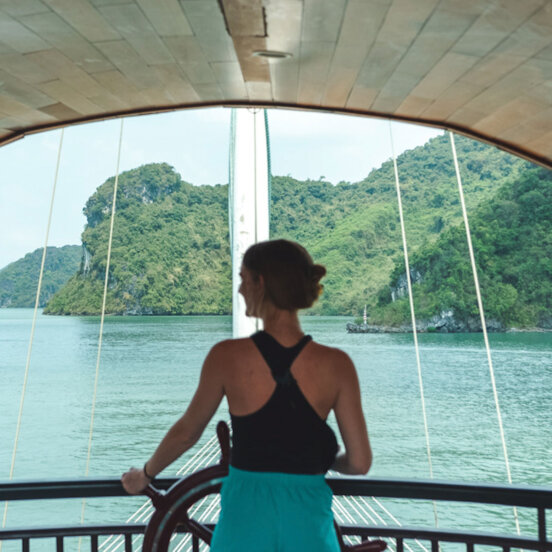Healthy body, healthy mind: can “adventure therapy” be a prescription for better mental health?

Nevin Harper, an adventure-therapy researcher, was heading towards the end of a high-altitude hiking trip with students in Bolivia one night when he noticed the Southern Hemisphere skies had come alight with stars.
“I went to the tents where the college students were sleeping and started dragging their bags out into the open,” he explains. “Of course, they were complaining, like, ‘What the heck are you doing, Nevin?’ And then they looked up.
“There was a true dark sky with no cloud cover and they’d never seen stars like it – the Milky Way was lighting up the glaciers on the mountain. I told them to crawl back in when they were done, but many of them stayed out there for a long time. They were overwhelmed.”

The adventure state happens after you get past the fear
It’s “spiritual” moments of reflection like these that Dr. Harper, Professor at the University of Victoria and one of Canada’s leading outdoor educators, believes may lie at the core of the restorative power of outdoor adventure.
“The full adventure state includes what happens after the activity starts and you get past the fear,” he says. “It’s these quiet times when you’re skimming rocks into the ocean after a long day’s paddling, or relaxing at camp on a mountain climb. When the cortisol drops off and your body starts producing good hormones – that’s when nature provides opportunities for your body to be in harmony with natural rhythms.”
Harper is part of a growing body of global researchers who are cautiously examining the concept of adventure therapy. While the link between nature and better mental health is well-documented, adventure therapy takes the notion one step further by layering nature with an element of challenge – an outdoor experience that might include anything from paddleboarding to mountain hiking or canyoning.

Researchers are examining the concept of adventure therapy
The idea is taking root in research communities and covers a wide range of adventure types (educational, recreational), along with a broad gamut of expectations within that. “It’s contested territory because we can’t assume risk is good for people,” says Harper, who joined hundreds of fellow researchers at the triennial International Adventure Therapy Conference in Norway earlier this year.
One area in which adventure can spark growth, however, is in its ability to “play with levels of comfort or discomfort” – as well as the process of self-discovery. “Through a given outdoor challenge, you get to learn about some unknown strength or capacity that you already have within you,” he says.
This is certainly the case for Helen Rogers, a UK-based personal trainer who took up equestrian event jumping on cross-country courses five years ago.
“There’s always an element of fear and uncertainty when you face a cross-country fence,” she says. “My heart is racing and I’m fully in the moment. My horse, Spirit, and I, just have to trust one another. I never know what will happen – and sometimes things do go wrong (last year we both took a fall and I ended up with a double break in my leg). Yet, I’ve been amazed by what I’ve been able to achieve in getting back into the sport, with a bit of hard work and determination. There’s nothing like the buzz of completing a course.”

There’s a system in place so you’re not just winging it
For psychotherapist Charlotte Fox Weber, author of What We Want, the tightrope of excitement that Helen describes is central to the therapeutic potential of adventure. “That connection to the earth is so powerful because it takes us to our problems but also takes us out of them,” she says. “And it’s underscored by this tension between our conflicting desire for safety and excitement.”
“For example, rock climbing has been a really powerful activity for me and for the people I’ve worked with,” Charlotte continues. “You’re going to new terrain or places; it’s stimulating, maybe overwhelming, and you don’t necessarily believe you can get there. At the same time, there’s a system in place so that you’re not just completely winging it. As challenging as it is, you’re not actually out of control.”

Allowing for surprise and uncertainty can be transformative
Adventure is also helpful for us because it’s expansive, allowing us to escape the staleness of our daily routines. “We tend to get worried about surprise; we think that we need to know what’s coming,” Fox Weber says. “Actually, allowing for that uncertainty, or even playfulness and creativity – all of which adventure brings – can be transformative. It’s an antidote to our overly sanitised lives.”
Harper agrees that “it’s harder and harder to have experiences in life where you might get hurt, you might fall down – as in the dynamics of an outdoor environment”. “Many of us desire deep challenges; our bodies are designed for it,” he says. “So part of adventure therapy may be about choosing particular environments that have some level of challenge, but that, at the same time, are hopefully doable.”

Tamika faced her fear of bees and saw her anxiety levels drop
For Tamika Martin, a director and PR consultant, this quest came about with a visit to The Bee School in Scotland’s Loch Lomond. “I despise bugs of any kind, particularly flying insects,” she says.” I took the challenge of hanging out with the Queen Bee and her tribe. We were suited to get up close and personal with thousands of bees, some of which were allowed to swarm.”
Martin’s experience of confronting her fear within an outdoor environment means “my anxiety levels in general have changed for the better”. She’s now planning a speedboat trip in Croatia to overcome her anxiety around being in the open sea.
Of course, the concept of adventure therapy is broad and – even with depression and anxiety rates soaring – it shouldn’t be viewed as a catch-all elixir for better mental health. Indeed, for someone who already feels vulnerable, it could be counterproductive.

Once up in the mountains, Tony’s mind cleared
At a basic level, it’s a journey that begins with listening to natural curiosity, rather than resisting it. “When people come to me with memories or thoughts of particular activities – for example, sailing – I encourage them to take it seriously and honour these things,” says Fox Weber. “There is a humility and wonder that comes with being part of a vast landscape,” she says. “Just remembering that we’re part of something bigger can be consoling.”
Tony Stevens, a New Zealand-based photographer, found exactly that freedom on a trek to Everest base camp. Having recently suffered the death of a loved one, along with a painful break-up, he says “I needed to do something just for me.” Once up in the mountains, he continues, “I couldn’t feel any of the paralysing emotions that had been plaguing me at home. My head might have been in the clouds, but my mind was the clearest it had been in a long time. I felt renewed.”
Try out adventure therapy for yourself on a group solo trip with Flash Pack.
Got a story or adventure that could inspire a solo traveller like you? Tag @flashpack on social or email [email protected] to be featured.
Images: courtesy of Nevin Harper, Tamika Martin, Tony Stevens, Flash Pack & Unsplash








